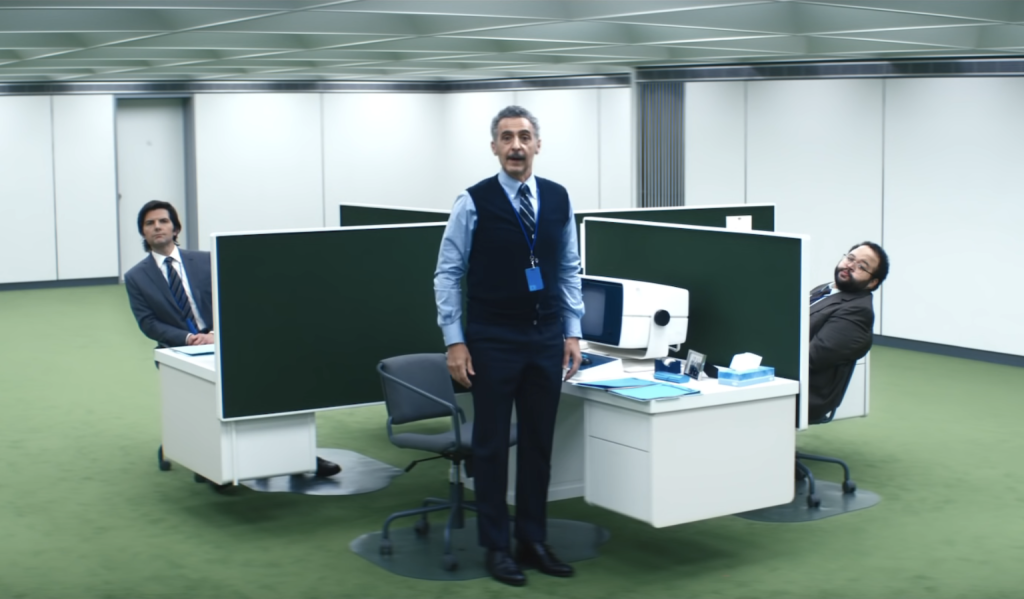”The Good News About Hell” S1/E1

”All labor that uplifts humanity has dignity and importance and should be undertaken with painstaking excellence.” Martin Luther King, Jr.
”Severence” is, in part, a genre series. It falls within the long-standing tradition of the workplace show. “The Office” comes immediately to mind, but so too should “Mad Men,” “Cheers,” “The Mary Tyler Moore Show,” “E.R.,” “The West Wing,” and even “The Sopranos.” Going to work is something almost all of us know and do. And we also understand the difference between our workplace selves and our away from work personas.
The phrase we will hear to describe the Macrodata Refinement Department in Lumon is that “the work is mysterious and important.” That conceit is at the core of most workplace shows. You continue to watch “The West Wing” because you want to know what it’s like to work in the White House (even though you’d get a more accurate picture from “Veep.”) But in MDR, the work is so mysterious and supposedly important that they cannot even fully explain it to you, they just let you see them working at computers doing something with trackballs akin to emotional sudoku, hour after hour.
And, like in every workplace real and imagined, there is banter and routines. This workday, for example, starts with Dylan threatening to tear Mark’s larynx out if he breathes on him, not wanting to catch whatever he might have (and presumably what he caught from Petey, the department head.) Our first image of Dylan is someone extremely confident in his work and with high status in the office. He’s about to wrap something called the Tumwater file—and needs Petey to process it so he can get his “waffle party” as a reward.
This brings me to the first oddity in the “Severence” story arc that will reach a higher importance in season two. All of the MDR employees seem to be engaged in critical work that is equally rewarded by management. But it becomes obvious in season two that only Mark is involved in the mission critical objective for the company. This raises the possibility that everyone else who works in MDR exists in a workplace simulacrum, doing markedly less important—or even possibly completely pointless—work just to give Mark the impression of camaraderie. But leave this point aside for now, we’ll come back to it later.
Every workplace comedy needs a character with a stock phrase, and Irving enters with one: “hi kids, what’s for dinner?” Irving is played by veteran actor John Turturro, the first major star we are introduced to on the cast (although certainly Adam Scott has his followers from “Parks and Recreation.”) Turturro has had a long, distinguished career, but I know him best as a Coen brothers regular, especially from “Miller’s Crossing,” “Barton Fink,” and “The Big Lebowski,” and also from his critical role in Spike Lee’s “Do The Right Thing,” Having just name checked some of my all-time favorite movies, I have higher expectations whenever Turturro comes onscreen,
He doesn’t disappoint as Irv, the elder statesman of the floor, holder of Lumon lore and walking directory of company policy. In fact, Mark has to warn Dylan to be careful when he calls something “typical Lumen bullshit” as Irv walks in. He apparently didn’t hear the gripe, because he opens with his catch phrase, leading to a short discussion about how much everyone hates it and the general confusion about it, such as does it mean that the children are preparing dinner? That joke underscores the continued sense of Lumon being a community of absent mothers.
Irv seems to enjoy the disdain over his stock phrase and then responds to another Dylan gripe by saying that company rewards have gotten way out of hand, that they used to just shake somebody’s hand and “fill up the creamer” when a project was complete. Irv gives off the sense of having worked at Lumon forever, but we later learn that he was actually a career officer in the U.S. Army, and many of his mannerisms match that of a military man.
To underscore this point, when Mr. Milchick, the floor coordinator/enforcer walks in, Irv stands at attention and greets him. But it’s Mark who Milchick is there to see—and he whisks him away to the “new office” of floor manager Ms. Cobel. Once again, we are slow walked down white corridors with music in the background reminiscent of what 1970s game shows would play while contestants were contemplating answers. Milchick advises Mark to compliment her new office, saying it would “make her day.”
Ms. Cobel, of course, immediately says the office is “horrid,” leading Mark to backtrack and say the other was better. At this point we don’t know if this was a microaggression from Milchick, and honestly, we probably never will know, but it fits a pattern.
Ms. Cobel tells Mark he looks terrible and hung over. Being severed, Mark has no idea what being hung over means, so he just rolls with it. Milchick plugs in a speaker and Ms. Cobel informs Mark that “the board” will be joining the meeting remotely. The meeting begins in silence, everyone I suppose waiting for Mark to speak. And he does, mentioning that he’s filled in for Petey before as floor manager when the boss has been out, but Ms. Cobel interrupts to tell Mark that Petey is no longer with the company, then repeats. Milchick chimes in his sorrow, saying Mark and Petey was “one of my favorite office friendships.” He then adds that saying more would violate Petey’s privacy.
Ms. Cobel informs Mark that he is now the new department chief of MDR. Of course, she does so with a ritual of exchanging one solid blue keycard for another and telling Mark that he has the “freedom to serve Kier” in this role. She offers a handshake “upon request,” which Mark requests.
Patricia Arquette plays Ms. Cobel, she being best known as the Oscar winning Actress from “Boyhood,” and for her roles in “True Romance,” “Lost Highway,” and the highly underrated 2000s series “Medium.” So between Turturro and she, we have connections to Spike Lee, the Coen brothers, Quentin Tarantino, David Lynch, Richard Linklater and many more, adding another layer of heft to the project.
Mark is then told that his first duty in this new role will be to onboard a replacement severed employee and he’s handed the binder he will use to introduce Helly to the office. The show’s backtrack is now just about complete, we’re about to catch up to the opening scene. Mr. Milcheck offers him a few moments to read through the manual to prepare, but Mark curtly tells him no. Perhaps he’s still upset about how his office compliment fell flat.
On the way out the door, Mark calls back to the board to thank them. Ms. Cobel informs him that the board “won’t be participating in this meeting … vocally.”
In little over six minutes, “Severence” creates the “situation” taking up the bulk of the series. All it needs now is the fourth element, Helly.
